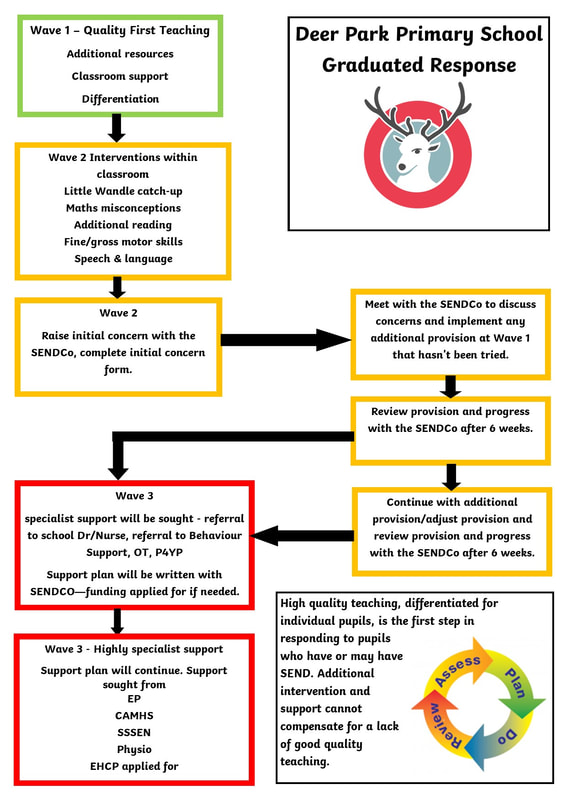SEND Provision Report Special Educational Needs and Disability Information |
This policy complies with the statutory requirement laid out in the SEND Code of Practice 0-25 (June 2014) 3.65 and has been written with reference to the following guidance and documents:
- Equality Act 2010: advice for schools DfE February 2013
- SEND Code of Practice 0-25 (June 2014)
- Schools SEND Information Report Regulations (2014)
- Statutory Guidance on supporting pupils at school with medical conditions April 2014
- The National Curriculum in England Key Stage 1 and 2 framework document September 2013
- Safeguarding Policy
- Accessibility Plan
- Teachers Standards 2012
INFOrMATION
The named person who is responsible for managing the provision for SEND at Deer Park Primary School (SENDCO) is Mrs Tracy Lugg. Mrs Lugg can be contacted through the School Office on or via email:
The named Governor for SEND is Mrs Joanne Lee who can be contacted through school on the above number and email.
The content of the SEND policy reflects the SEND Code of Practice 2014, 0-25 guidance. It has been shared with the school’s governing body and will be reviewed regularly.
An annual SEND Information Report will be shared with parents, carers and the governing body and published on the school’s website.
Every teacher is a teacher of every child or young person including those with SEND. As such Deer Park Primary School adopts a ‘whole school approach’ to special educational needs which involves all staff adhering to a model of good practice. The staff of the school are committed.
The content of the SEND policy reflects the SEND Code of Practice 2014, 0-25 guidance. It has been shared with the school’s governing body and will be reviewed regularly.
An annual SEND Information Report will be shared with parents, carers and the governing body and published on the school’s website.
Every teacher is a teacher of every child or young person including those with SEND. As such Deer Park Primary School adopts a ‘whole school approach’ to special educational needs which involves all staff adhering to a model of good practice. The staff of the school are committed.
Objectives
|
Definition of Special Educational Needs.
What does SEND mean?
SEND means special educational needs and disabilities. Children have a special need if they have a learning difficulty which calls for special educational provision to be made. This will be if the child:
Communication and Interaction (This includes children with speech and language delay, impairments or disorders, specific learning difficulties such as dyslexia, dyscalculia, dysgraphia and dyspraxia, hearing impairment, and those who demonstrate features within the autistic spectrum).
Cognition and Learning (This includes children who demonstrate features of moderate, severe or profound learning difficulties or specific learning difficulties or specific learning difficulties such as dyslexia, dyscalculia, dysgraphia or dyspraxia).
Social, Mental and Emotional Health (This includes children who may be withdrawn or isolated, disruptive or disturbing, hyperactive or lack concentration).
Sensory and/or Physical Needs (This includes children with sensory, multi-sensory and physical difficulties).
Behavioural difficulties do not necessarily mean that a child or young person has a SEND need and should not automatically lead to a pupil being registered as having SEND.
The following are not considered to be SEND but they may impact on progress and attainment:
- Has significantly greater difficulty in learning than the majority of children of the same age; or
- Has a disability which prevents or hinders them from making use of educational facilities of a kind generally provided for children of school age within the Local Authority.
Communication and Interaction (This includes children with speech and language delay, impairments or disorders, specific learning difficulties such as dyslexia, dyscalculia, dysgraphia and dyspraxia, hearing impairment, and those who demonstrate features within the autistic spectrum).
Cognition and Learning (This includes children who demonstrate features of moderate, severe or profound learning difficulties or specific learning difficulties or specific learning difficulties such as dyslexia, dyscalculia, dysgraphia or dyspraxia).
Social, Mental and Emotional Health (This includes children who may be withdrawn or isolated, disruptive or disturbing, hyperactive or lack concentration).
Sensory and/or Physical Needs (This includes children with sensory, multi-sensory and physical difficulties).
Behavioural difficulties do not necessarily mean that a child or young person has a SEND need and should not automatically lead to a pupil being registered as having SEND.
The following are not considered to be SEND but they may impact on progress and attainment:
- Disability (if reasonable adjustments can be made Code of Practice 0-25)
- Attendance and Punctuality
- Health and Welfare
- EAL (English as an Additional Language)
- Being in receipt of Pupil Premium Grant
- Being a Looked After Child
- Being a child of a Serviceman / woman
identification of pupils’ needs
|
All our children are treated as individuals and the class teacher, alongside other support staff, plan an appropriate differentiated curriculum for our children with additional needs to ensure high quality teaching and learning with effective support and resources.
Clear individual education plans, assertive mentoring targets and care plans are put in place and reviewed regularly. A range of carefully tailored interventions are developed, reviewed and evaluated to ensure maximum progress and impact for our children. Key assessments (1/2 termly) ensure that children are on track to meet targets and planning accurately addresses needs. Progress, targets and plans are regularly reviewed with the children and evaluated to inform the next steps. A graduated approach: Quality First Teaching
|
Identification and assessment of pupils’ SEND will include:End of Key Stage attainments 2. Assessment for Learning materials 3. Standardised tests 4. Teacher observation 5. Information and advice from other agencies 6. Views of the pupil 7. Views of the parents 8. Diagnostic tests 9. Dynamic forms of assessment which involve:
|
REFERRAL FOR AN EDUCATION, HEALTH AND CARE PLAN
If a child has lifelong or complex difficulties they may undergo a Statutory Assessment Process which is usually requested by the school but can be requested by a parent. This will occur where the complexity of need or lack of clarity around the needs of the child are such that a multi-agency approach to assessing that need, to planning provision and identifying resources, is required.The application for an Education, Health and Care Plan will combine information from a variety of sources including:
Further information about EHC Plans can be found via the SEND Local Offer : www.derbyshire.gov.uk/SENDD
- Teachers / SENDCO
- Parents
- Social Care
- Educational Psychologist / Clinical Psychologist (if appropriate)
- Health Professionals – CAMHS, School Health, Paediatricians
Further information about EHC Plans can be found via the SEND Local Offer : www.derbyshire.gov.uk/SENDD
EDUCATION, HEALTH AND CARE PLANS (EHC)
Each identified child has an Support Plan or Behaviour Plan that is drawn up by the class teacher and SENDCo. They are all differentiated according to the child’s specific needs under the title of SEN Support. SEN support provides practical advice on how to carry out statutory duties to assess, plan, review and improve outcomes for children and young people with special educational needs. This replaces School Action/ School Action Plus categories.
- Following Statutory Assessment, an EHC Plan will be provided by Derbyshire County Council, if it is decided that the child’s needs cannot be met by the support that is ordinarily available. The school, child’s parents and other professionals who support the child will be involved in developing and producing the plan.
- Parents have the right to appeal against the content of the EHC Plan. They may also appeal against the school named in the plan if it differs from their preferred choice.
- Once the EHC Plan has been completed and agreed, it will be kept as part of the pupil’s formal record and reviewed at least annually by staff, parents and the pupil. The EHC Plan will also ‘move’ with the child. The annual review (Child Centred Review) enables provision for the pupil to be evaluated and, where appropriate, for changes to be put in place, for example, reducing or increasing levels of support / amending objectives.
The SEND Local Offer is a resource which is designed to support children and young people with special educational needs and/or disabilities and their families.
It describes the services and provision that are available both to those families in Derbyshire that have an Education, Health and Care Plan and those who do not have a plan, but still experience some form of special educational need. The SEND Local Offer includes information about public services across education, health and social care, as well as those provided by the private, voluntary and community sectors. More information can be found by clicking the button below. |
INCLUSION OF ALL PUPILS WITH SENDThe Headteacher and SENDCO oversee the school’s policy for inclusion and are responsible for ensuring that it is implemented effectively through school. The school curriculum is reviewed to ensure that it promotes the inclusion of all pupils. This includes learning outside the classroom. The school will seek advice, about individual children, with external agencies when appropriate. The admission arrangements for all pupils are in accordance with national legislation, including the Equality Act 2010. This includes children with any level of SEND; those with Education, Health and Care Plans and those without. |
LINKS WITH SUPPORT SERVICESThe school has a strong working relationship and links with external support services in order to fully support our SEND pupils and aid school inclusion. Sharing information and knowledge with support services is key to the effective and successful SEND provision at our school and includes:
|
WORKING IN PARTNERSHIP WITH PARENTS / CARERS
We believe as a school that a close working partnership with parents/carers is vital to ensure that:
- Information is shared with everyone
- Early and accurate identification and assessment of SEND leading to appropriate intervention and provision
- Continuing social, emotional and academic progress of children with SEND
- Personal and academic targets are set and met effectively (Assertive Mentoring)
SUPPORTING PUPILS AND FAMILIES
|
SUPPORTING CHILDREN IN SCHOOL WITH MEDICAL CONDITIONS
The school recognises that pupils with medical conditions should be properly supported so that they have full access to education, including school trips and physical education. Some children with medical conditions may be disabled and where this is the case the school will comply with its duties under the Equality Act 2010.
Some may also have Special Educational Needs and may have a Statement, or Education, Health and Care Plan which brings together health and social care needs, as well as their special educational provision and the SEND Code of Practice (2014) is followed. Arrangements are put in place to support individual pupil’s with their specific medical needs / conditions.
Meetings are held between parents, and the relevant medical professionals. Where appropriate Health Care Plans are drawn up. Staff administering medicines or working with children with specific needs receive regular training. We work in accordance with the Supporting Pupils at School with Medical Conditions published by the DFE in April 2014, the school policy is on the website.
Some may also have Special Educational Needs and may have a Statement, or Education, Health and Care Plan which brings together health and social care needs, as well as their special educational provision and the SEND Code of Practice (2014) is followed. Arrangements are put in place to support individual pupil’s with their specific medical needs / conditions.
Meetings are held between parents, and the relevant medical professionals. Where appropriate Health Care Plans are drawn up. Staff administering medicines or working with children with specific needs receive regular training. We work in accordance with the Supporting Pupils at School with Medical Conditions published by the DFE in April 2014, the school policy is on the website.







